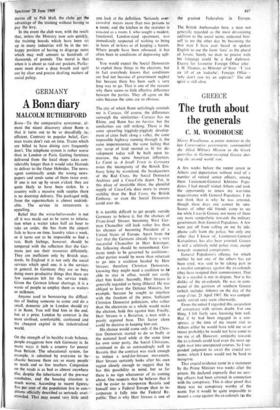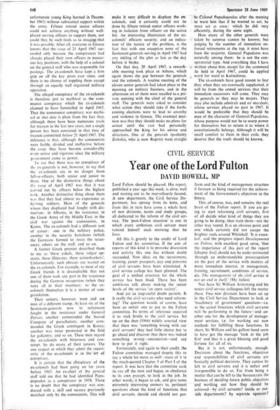The truth about the generals
GREECE C. M. ‘VOODHOUSE
MOM), Woodhouse, a junior minister in the last Conservative government, commanded the Allied Military Mission to the Greek guerrillas in German-occupied Greece dur- ing.the second world war.
A few, weeks before the recent arrest in Athens and deportation without trial of a number of retired senior officers, among them Lieutenant-General Khristos Papa- datos, I had myself visited Athens and took the opportunity to renew my war-time acquaintance with General Papadatos. I do not think that is why he was arrested, though these days one cannot be sure. Scores of other old friends came to sec me while 1 was in Greece, not many of them any more sympathetic towards the military government than General Papadatos. A few were put off from calling on me by tele- phone calls from the police; but only one other that I know of, Lieutenant-General Katsadimas, has also been arrested. Greece is still a relatively mild police state, except towards suspected conspirators.
General Papadatos's offence, for which neither he nor any of the others has yet been tried, was said to be taking part in a royalist conspiracy against the ex-colonels (they have resigned their commissions). That he is a royalist is not in dispute. Nor is his dislike of the ex-colonels. He was in com- mand of the garrison of southern Greece (which includes Athens) on the day of the coup demi. 21 April 1967. He was compul- sorily retired very soon afterwards.
From the outset I regarded this accusation of conspiracy with serious doubt. For one thing. I felt fairly sure, knowing him well, that if he had been engaged in a con- spiracy at the time of my recent visit to Athens either he would have told me so or (more probably) he would not have come to see me at all. However, antipathy towards the ex-colonels could lead even the most up- right man into unexpected courses. So I sus- pended judgment to await the crucial evi- dence. which I knew would not be hard to recognise.
That crucial evidence came in a statement by the Prime Minister two weeks after the arrests. He declared expressly that no serv- ing officers had been arrested in connection with the conspiracy. This is clear proof that there was no conspiracy worthy of the name. For it would be quite impossible to mount a coup against the ex-colonels (as the
unfortunate young King learned in Decem- ber 1967) without substantial support within the army. Fifteen retired senior officers could not achieve anything without well- placed serving officers to support them, nor could they be such fools as to imagiwthat it was possible. After all, everyone in Greece knows that the coup of 21 April 1967 suc- ceeded only because the conspirators had already placed their own officers in numer- ous key positions, with the help of a colonel on the general staff who was responsible for postings. The ex-colonels have kept a firm grip on all the key posts ever since, and there is no chance of toppling them except through an equally well organised military operation.
The alleged conspiracy of the ex-colonels is therefore just as mythical as the com- munist conspiracy which the ex-colonels claimed to have forestalled in April 1967. That the communist conspiracy was mythi- cal at that date is plain from the fact that, although there have been numerous trials for treason in the last two years, not a single person has been convicted in that time of treason committed before 21 April 1967. The inference is that, although the communists were feeble, divided and ineffective before the coup, they have become considerably more active and vigorous since the military government came to power.
To say that there was no conspiracy of the ex-generals is not, however, to say that the ex-colonels are in no danger from fellow-officers, both senior and junior to them. One of the distinctive things about the coup of April 1967 was that it was carried out by officers below the highest rank. Another distinctive thing about them v.:Is that they had almost no experience as fig'Iting soldiers. Most of the generals whom they displaced had fought with dis- tinction : in Albania, in the resistance, in the Greek Army of the Middle East, in the civil war against the communists, in Korea. The ex-colonels had a different sort of career: one in the military police, another in the security battalions (which the Germans formed to resist the resist- ance), others on the staff, and so on.
A former Greek premier described them to me as 'these yokels, these vulgar up- starts, these illiterates, these scrimshankers'. Unfortunately, such phrases are wasted on the ex-colonels. For example, to most of my Greek friends it is discreditable that not one of them took any part in the resistance during the German occupation (when they were all in their twenties): to the ex- colonels themselves it is a matter of con- gratulation.
Their seniors, however, were and are men of a different stamp. At least six of the lieutenant-generals now in retirement fought in the resistance under General Zervas; another commanded the Sacred Company of parachutists; another com- manded the Greek contingent in Korea; another was twice promoted in the field for gallantry; and so on. These men regard the ex-colonels with bitterness and con- tempt. So do many of their juniors. The one respect in which they admit the superi- ority of the ex-colonels is in the art of conspiracy. It is certain that the conspiracy of the ex-colonels had been going on for years before 1967. An ex-chief of the general staff told me that he had identified Papa- dopoulos as a conspirator in 1958. There is no doubt that the conspiracy was con- ducted with a skill and secrecy previously matched only by the communists. This will
make it very difficult to displace the ex- colonels, and it certainly could not be done by fifteen retired senior officers work- ing in isolation from officers on the active list. An interesting illustration of the ex- colonels' efficient security, and an indica- tion of the nature of the problem, is the fact that with one exception none of the lieutenant-generals serving in April 1967 had any inkling of the plot as late as the day before it broke.
On that day, 20 April 1967, a remark- able meeting took place in Athens, which again shows the gap between the generals and the colonels. A routine meeting of the eleven senior generals had taken place in the morning on military business, and in the afternoon six of them were recalled to a pri- vate meeting with the chief of the general staff. The generals were asked to consider what action they should take if the forth- coming elections were to lead to anarchy and violence in Greece. The eventual deci- sion was that they should make no plans for action until the CGS had personally approached the King for his advice and directions. One of the generals (probably Zoitakis, who is now Regent) went straight lo Colonel Papadopoulos after the meeting :_ to warn him that if he wanted to act, he must act at once: which he did, very efficiently, during the same night.
How many of the other generals were taken by surprise cannot be known; but judging by the number of immediate en- forced retirements at the top, it must have been the majority. General Papadatos was naturally among them: he is not the con- spiratorial type. And everything that I have written about him, except for the command he held in April 1967, could be applied word for word to Katsadimas.
The ex-colonels have good reason to fear that, when they are eventually supplanted, it will be from the armed services that their immediate successors will come. They may be generals or they may be majors. They may also include admirals and air marshals, whose services played no part in 1967. It would be preferable that they should be men of the character of General Papadatos, whose purpose would not be to usurp power for themselves but to return it to where it constitutionally belongs. Although it will be small comfort to them in their exile, they deserve that the truth should be known.



































 Previous page
Previous page